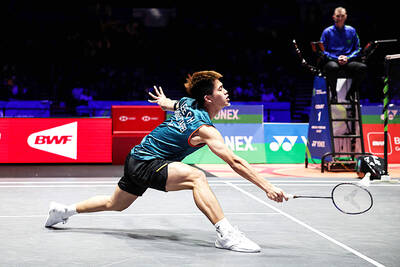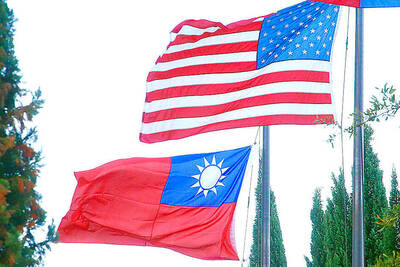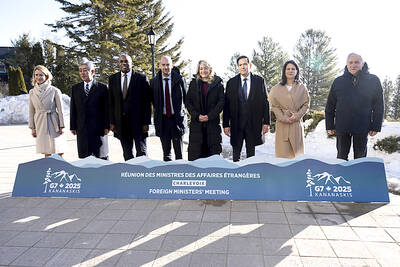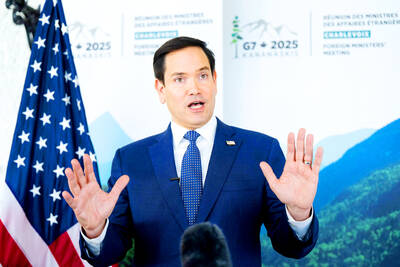Contrary to the popular belief that the US government strongly opposes President Chen Shui-bian's (
The source said that some US officials have told him privately that Taiwan should not worry too much about what the State Department says because its remarks are made to appease Beijing.
"The US government is not necessarily weak in the face of China and the US military and intelligence agencies do not always fully agree with the State Department," the source said.
"There are two voices inside the US government -- those who are more hawkish, such as those in the CIA and Department of Defense, and those who are more moderate, such as those in the State Department," said the source, who spoke on condition of anonymity.
The source said that although he did not hear President Chen Shui-bian (陳水扁) say during a closed-door dinner party on Wednesday that he would abolish the council and guidelines regardless of US pressure in the other direction, Chen did say that Taipei would continue to negotiate with Washington and allay its concerns.
Chen had also admitted he was under tremendous pressure from the US, similar to the pressure he received when he proposed the nation's first referendum, the source said.
The source also quoted Chen as saying that the proposal to abolish the unification council and guidelines was not a spur-of-the-moment idea.
When asked what the best timing would be to proceed with a formal push against the guidelines and the NUC, the source suggested that Feb. 28 would be a good time.
The National Security Council is studying the feasibility of eliminating the NUC and the guidelines and is expected to reach a decision by the end of this month.
Ng Chiau-tong (
Ng said Washington's position was important but not the ultimate arbiter of Taipei's policy.
"We respect their opinions but they cannot make any decisions for us," he said.
National Policy Adviser to the President Chin Heng-wei (金恆煒) echoed that view, and said that he had heard of a Feb. 28 date being used to announce that formal abolition would commence.
Meanwhile, nearly 50 percent of respondents surveyed in a new poll said they would opt for independence if they had to choose between independence and unification.
The survey, conducted by the Liberty Times (the Taipei Times' sister newspaper) from Monday to Wednesday this week, found that 49.3 percent of respondents said they preferred independence, while 26 percent favored unification and 24.6 percent said they had no opinion.
also see stories:
Chen's NUC bid may succeed: academics
President Chen knows just what he is doing

Taiwan’s Lee Chia-hao (李佳豪) on Sunday won a silver medal at the All England Open Badminton Championships in Birmingham, England, a career best. Lee, 25, took silver in the final of the men’s singles against world No. 1 Shi Yuqi (石宇奇) of China, who won 21-17, 21-19 in a tough match that lasted 51 minutes. After the match, the Taiwanese player, who ranks No. 22 in the world, said it felt unreal to be challenging an opponent of Shi’s caliber. “I had to be in peak form, and constantly switch my rhythm and tactics in order to score points effectively,” he said. Lee got

EMBRACING TAIWAN: US lawmakers have introduced an act aiming to replace the use of ‘Chinese Taipei’ with ‘Taiwan’ across all Washington’s federal agencies A group of US House of Representatives lawmakers has introduced legislation to replace the term “Chinese Taipei” with “Taiwan” across all federal agencies. US Representative Byron Donalds announced the introduction of the “America supports Taiwan act,” which would mandate federal agencies adopt “Taiwan” in place of “Chinese Taipei,” a news release on his page on the US House of Representatives’ Web site said. US representatives Mike Collins, Barry Moore and Tom Tiffany are cosponsors of the legislation, US political newspaper The Hill reported yesterday. “The legislation is a push to normalize the position of Taiwan as an autonomous country, although the official US

CHANGE OF TONE: G7 foreign ministers dropped past reassurances that there is no change in the position of the G7 members on Taiwan, including ‘one China’ policies G7 foreign ministers on Friday took a tough stance on China, stepping up their language on Taiwan and omitting some conciliatory references from past statements, including to “one China” policies. A statement by ministers meeting in Canada mirrored last month’s Japan-US statement in condemning “coercion” toward Taiwan. Compared with a G7 foreign ministers’ statement in November last year, the statement added members’ concerns over China’s nuclear buildup, although it omitted references to their concerns about Beijing’s human rights abuses in Xinjiang, Tibet and Hong Kong. Also missing were references stressing the desire for “constructive and stable relations with China” and

‘CROWN JEWEL’: Washington ‘can delay and deter’ Chinese President Xi Jinping’s plans for Taiwan, but it is ‘a very delicate situation there,’ the secretary of state said US President Donald Trump is opposed to any change to Taiwan’s “status quo” by force or extortion and would maintain that policy, US Secretary of State Marco Rubio told the Hugh Hewitt Show host on Wednesday. The US’ policy is to maintain Taiwan’s “status quo” and to oppose any changes in the situation by force or extortion, Rubio said. Hewitt asked Rubio about the significance of Trump earlier this month speaking with Taiwan Semiconductor Manufacturing Co (台積電) chairman C.C. Wei (魏哲家) at the White House, a meeting that Hewitt described as a “big deal.” Asked whether the meeting was an indication of the